Pentiment – Test: Now I know what drove our ancestors!

The year is 1518. Luther has just published his theses and the printing press is causing a rapid spread of literature that was once the preserve of handcrafted books. It is the beginning of the Reformation – and the time when Andreas Maler, who is actually a painter, is working on the picture with which he wants to make his master.
He does that in Kiersau, a fictional abbey in Bavaria, which, like the entire scenario, was modeled very closely on reality. This also applies to the equally imaginary place of Tassing at the foot of the abbey, where Andreas rented a room for the duration of the creation of his masterpiece. He therefore knows the people and their concerns, but as a visitor he is always just an outsider and an observer of what is happening.
This makes him the perfect protagonist, because his environment allows him a certain curiosity and he is not only a welcome guest in Tassing, but can also move relatively freely among the monks and nuns of the abbey. Because these are different social groups with very different privileges.
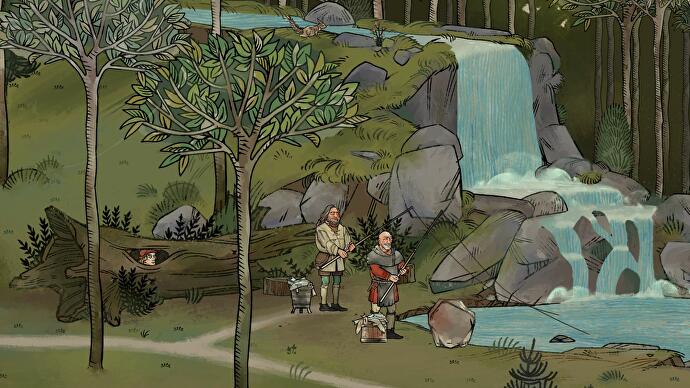
Above all, however, this is important for the story, since one of the monks and friend of Andreas is soon accused of a murder that he apparently did not commit. That’s why Andreas makes it his task to question the people in Tassing and Kiersau in order to find the murderer. And so Pentiment is essentially a detective game in which you follow clues relatively freely and at some point you make the decision which of them you present to the archdeacon, who will then make his decision.
Should you hand over a suspicious monk who has treated Andreas in a derogatory manner? What about those who held a grudge against the victim? Has an obvious culprit ever been found? Pentiment is full of decisions, some of which have serious consequences.
everyday life as it once was
Don’t get the game wrong, though: those big moments aren’t the focus. Its essence does not lie in the staging of a dramatic tragedy, but in the depiction of a time marked by change and the hopes and concerns associated with it. Finally, after the verdict is passed, you leave Tassing, only to return there several times over a period of 25 years.
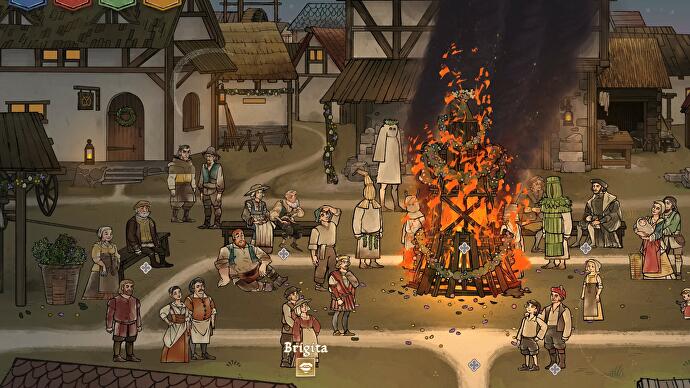
So you see how the place is changing. You talk to old and new acquaintances, get to know them as friendly, grim, satisfied and exhausted people who invite you to eat and talk about their worries. Out of pride they serve bread, although they don’t have any for their own plate. You learn that women didn’t necessarily become nuns of their own free will and you often realize that another small child has died.
Andreas himself is not only an uninvolved listener, but often made it difficult for me to find the right words. After all, all dialogues take place as multiple-choice conversations. But what are you supposed to answer when a poor woman asks how he is doing – he, whose greatest concern as a successful artist is those clients who get on his nerves with well-paid special requests? There were moments when Pentiment made me feel really bad after it had so intensely familiarized me with the contradictions in society. And then I find out that Andreas has already experienced things that haunt him every day and every night…
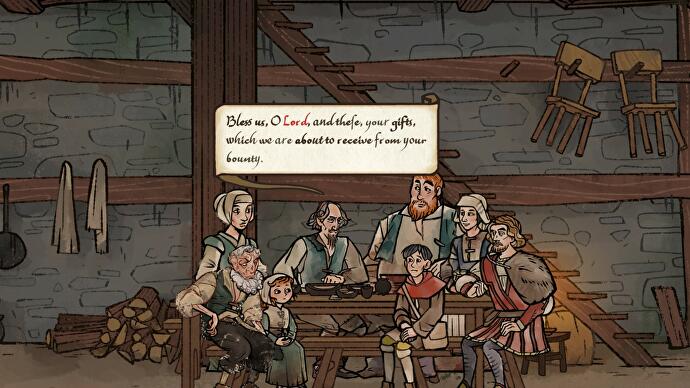
This complex characterization is really great. Josh Sawyer (known for Fallout: New Vegas or Pillars of Eternity) and his team describe the time and its people so vividly and comprehensively that I almost devoured the numerous conversations. Without being expansive or even instructive, but always focused on the everyday, they have suggested a piece of European history to me in a way that no textbook has ever managed.
Contemporary
They succeed, among other things, because the art design breathes contemporary style with every pixel. If I drew my eyebrows together at the first sight of the graphic, which is based on early modern woodcuts, I now find that particularly outstanding – not least because the few brushstrokes allow for a fine situational comedy, in which wide-eyed eyes are enough to reveal a great misery in Andreas’ drawing face.
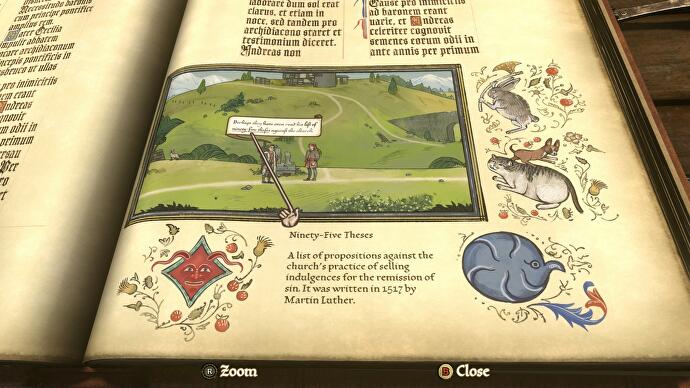
His notebook is also nice, in which not only all the characters are described, but also terms of the time are explained. All steps of his investigations are recorded as well as rough maps of Tassing and Kiersau. If names or designations appear in dialogs, they are also linked directly in the speech bubble. So you always have the full overview, which is why I gladly turned over the thick, crackling pages of the book to orient myself briefly.
Speaking of speech bubbles: the letters are displayed there in the way that the respective person would write according to their social or professional status. Therefore, when conversing with a monk, one first sees the neatly drawn outlines of the large letters before the letters are colored in, while many common people “talk” in normal handwriting. Terms related to God are also shown in red and only entered after all black characters have been applied. Last but not least, I find it wonderful that the interlocutors sometimes “make a mistake”, which is why individual letters have to be corrected afterwards.
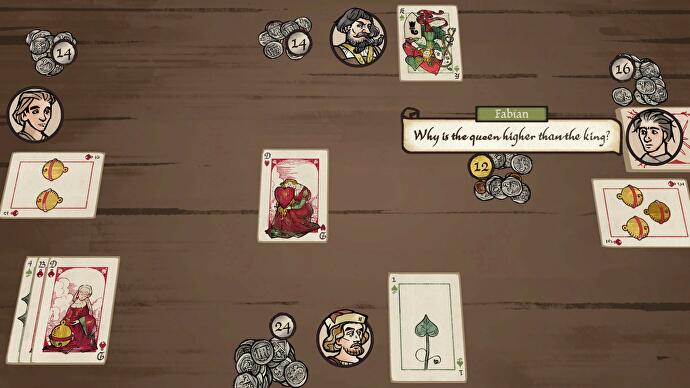
By the way, if you want, you can activate simplified, i.e. easier to read fonts or opt for a consistent contemporary display. You already know: when gargoyles become waffle spears. There’s so much thoughtful detail in Pentiment that it’s a joy to delve into!
An adventure, not a role-playing game
Maybe you shouldn’t make it bigger than it is: The “narrative adventure”, which initially emerged from a collaboration between Sawyer and artist Hannah Kennedy, and which has never been worked on by more than a dozen developers at a time, is not a large role-playing game , as you might expect from a title from Obsidian (The Outer Worlds). It’s also not a Disco Elysium, where you have much more freedom in the way you embody Andreas and how you solve your tasks. At the beginning one chooses which education Andreas has enjoyed and where earlier journeys have taken him, whereby additional answer options are available to him depending on the characterization.
But they are not necessarily better and some people can even get on their nerves if they quote the law or appear otherwise educated – these are sensible nuances. On the whole, however, the detective work follows largely predetermined paths. Because even if you can always choose who you talk to and when, and although you will most likely not find all the clues, since the number of central activities per day is limited: the bottom line is that the options for action in this guided narrative are quite manageable. One does not speak freely with people, but only where it is intended. This also applies to entering most places.
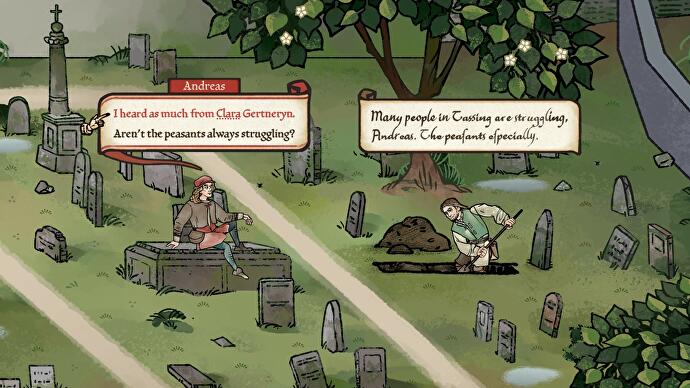
In fact, I was even disappointed that you can’t follow a very obvious lead at all, because the necessary interaction points aren’t even there in the first place. And then, of all things, at the meeting with the archdeacon one cannot argue in the only way that seemed logical to me, but is firmly guided to the point that Andreas stubbornly begins to list the suspects.
Most of the time, however, the illusion of structuring the conversation is convincing and I’m happy when Andreas sometimes talks to himself about which answer would actually be the best – if only because there is the following dialogue, among other things: “Think about it Best not to even think about it.” “Now I’m thinking about it!”
Most of the time it’s not about changing great destinies anyway, but about the tone in which you meet the others. Every now and then they remember how you treat them, and above all that has a greater or lesser effect later on. Very few become friends through individual extreme situations, but because you always stand by them.
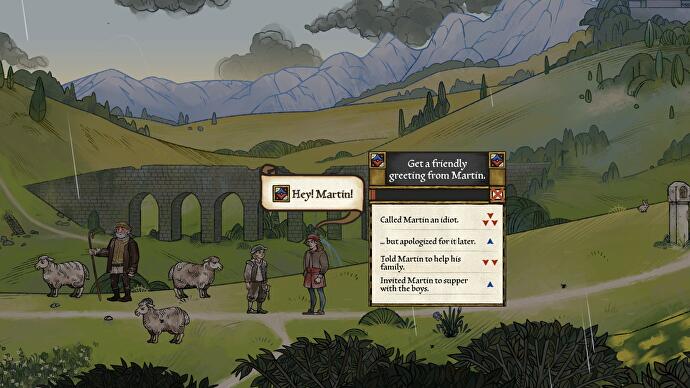
There are also conversations that are also embedded in the world in a playful way, since at the many meals, for example, you don’t see the people taking part, but the table on which the plates are placed. You then choose several times what to bite off next, i.e. you actively participate in the meal. And often it’s just such little things that make a world interesting and tangible.
Pentiment – conclusion
So this is Pentiment: an elegantly designed, carefully researched portrait of a time in which social upheaval not only affected politics, but above all ordinary people. And the game tells about these people. As a repeated visitor to a small town, you get to know them and their worries. You observe how her life changes, partly shape the change yourself, and thus gain insight into a fascinating world that is more real than that of many other games, not only because of the narrative background. As straightforward as the pure detective work may be, Pentiment is a unique piece of playable history!
Pentiment – Rating: 9/10
pros and cons
Per:
- Complex, very carefully researched historical scenario
- Stylish, quasi-contemporary presentation
- Exciting detective work on an interesting murder case as a hook, …
- … but the focus is always on people and their personal and family concerns
- Carefully prepared information with helpful links already in dialog windows
- Everyday doings like eating at meals are an active part in conversations
- Bigger decisions lead to lasting, tangible changes…
Cons:
- … overall, however, relatively manageable room for maneuver in detective work
- Every now and then meaningful dialogue options are not available
Developer: Obsidian Entertainment – Publishers: Microsoft – Platforms: PC, Xbox One, Xbox Series X/S release: 11/15/22 – Genre: role play, adventure Price (RRP): almost 20 euros
![]()
Reference-www.eurogamer.de